18 Sep 2014
Why Addicts Lie
If you have an addict in your life you have been through some trying times. Your addict has a disease, but it’s a tricky one. She may cheat on you, lie, neglect you, steal from you or even hurt you. For those in close relationships with an addict, lying is one of the most hurtful behaviors to experience. You expect honesty in your intimate relationships, but addicts lie all the time.
Reasons Addicts Lie
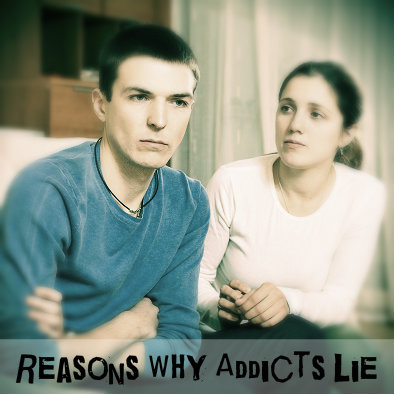 To help you cope with the lying and to learn to forgive and move past it, it helps to understand. Although it may not be right, there are real and valid reasons addicts lie.
To help you cope with the lying and to learn to forgive and move past it, it helps to understand. Although it may not be right, there are real and valid reasons addicts lie.
Addicts Lie To Avoid Confrontations
As you watched your loved one slide into addiction and ruin her life, you probably made numerous attempts to get her to stop. At times you may sound like a broken record and a nag. Maybe the issue has led to increased conflict. The stress of these confrontations is overwhelming and destructive for both of you. While you want to be honest, get the problem out in the open and find a solution, she just wants to avoid your hurt looks and anger. In order to get out of these conflicts and to avoid them, she will tell every lie imaginable.
Addicts Lie To Maintain The Addiction
Lies also help your addicted loved one to perpetuate her addiction. Most addicts are afraid to stop using for a number of reasons. They fear the idea of stopping because they feel like they need drugs or alcohol. The pain and discomfort of detoxing are scary and so is the possibility of failing. The idea of trying to live a sober life, and what that might be like, is even scarier. To keep the addiction going, your loved one will tell many lies. Lying becomes a tool for self-preservation.
Addicts Lie Because Of Shame
Addicts feel a great deal of shame. Although societal attitudes are very slowly changing, there is still a great deal of stigma attached to addiction. Many of us still view an addict as a person who is morally weak. It’s no wonder that addicts feel ashamed of what they do. Especially in sober moments, your loved one feels a huge sense of guilt, embarrassment and shame. Instead of working through these feelings, she uses more and then lies about it. She doesn’t want other people to realize just how badly she is doing.
Addicts Lie Because Of Denial
Denial is a powerful force and most addicts use it to cope with their problems. Despite all the evidence to the contrary, most addicts refuse to admit to having an addiction. They lie because they don’t want to make that admission. Your loved one probably thinks that she is different from other users. She can handle it, she says. She is in denial that her problem is no different from that of other addicts and as a result she lies to you and to herself.
As you cope with having a loved one addicted to drugs or alcohol, realize that her lying to you is not a personal attack. This is her coping mechanism and a rational part of the disease of addiction. This doesn’t mean that you should accept the lies. To help your loved one, you have to push through the falsehoods and ask her to face up to the truth. Don’t let her get away with lies when you catch them, but do provide ongoing love and support.
09 Sep 2014
The Long-Term Effects Of Underage Drinking
Prom, graduation and the start of summer vacation are all key times that trigger a rash of underage drinking. Unfortunately, teenage drinking is a year-round problem. Underage drinking can have some very serious immediate consequences.
Drinking too much can make a young person sick. It can lead to poor decision-making. It can lead to accidents. At the very least, drinking can make a young person feel awful the next day. What many young people fail to consider is that there are lasting consequences too.
Effects Of Long-Term Underage Drinking
Whether you’re a teen yourself or the parent of a teen, understand the long-term implications of underage drinking:
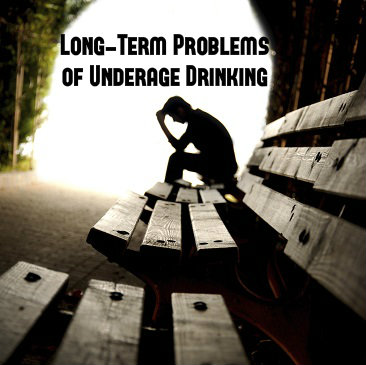 Legal Troubles – Most teens don’t think about getting caught before they drink, but many make bad choices when they do. These poor decisions can get a teen arrested for disorderly conduct, breaking and entering, drunk driving and more. The legal consequences can follow a young person for years, interfering with applications for college, scholarships or for jobs.
Legal Troubles – Most teens don’t think about getting caught before they drink, but many make bad choices when they do. These poor decisions can get a teen arrested for disorderly conduct, breaking and entering, drunk driving and more. The legal consequences can follow a young person for years, interfering with applications for college, scholarships or for jobs.
- Chronic Health Problems – When drinking starts at a young age and continues into adulthood, the accumulated effects can mean serious health problems. These may include pancreatitis, cirrhosis of the liver, hepatitis, high blood pressure, anemia and nutritional deficiencies. Drinking at a young age has also been shown to negatively impact the development of bone density, which can later result in osteoporosis
- The Brain – Drinking impacts the developing adolescent brain and causes problems that will continue into adulthood. It can cause permanent problems with memory and cause actual physical damage to the brain. The part of the brain involved in memory, the hippocampus, can be seen in scans to be smaller in people who drank a lot during adolescence than in their non-drinking peers. Other negative impacts include reduced attention spans, ability to think spatially and to plan.
- Accidents, Injuries, And Death – Drinking can lead to any number of accidents from drowning to falling to auto collisions. These have serious short-term consequences, but they can also impact a young person for the duration of their life. If an accident kills a young person, that life is over forever. For the underage drinker that causes a fatality, living with the guilt is a lifelong burden. Injuries may also stick with a young person and cause long-term health problems.
- Addiction – Drinking for the first time as a teen is a risk factor for developing an addiction or a substance abuse disorder later in life. In other words, underage drinkers put themselves at risk for having lifelong struggles with alcoholism or drug addiction.
- Family Problems -When young people drink it can impact the family in many negative ways. All of the terrible consequences that befall the teen drinker, like legal troubles, health problems and accidents, affect the dynamic of the family. Just one drinking incident with bad consequences can start a family crisis and everyone suffers.
The consequences of underage drinking are not difficult to imagine. Anyone who has ever had one drink too many knows just what can happen as a result. What most people, young and old, never think about are the long-lasting consequences. Teens who drink risk becoming addicted, damaging their brains, living with the guilt of hurting someone and having chronic health problems. With all of these and other possible negative outcomes, why would any young person choose to drink?
If You Know A Young Person Who Is Tempted To Drink Or Is Struggling – Call Us Now – We Can Help
The effects of synthetic marijuana are as varied as the substances that make up this broad category of drugs. Makers of synthetic marijuana products attempt to create something that is legal and that also mimics the active compounds in cannabis. Of course, most of these manufacturers are more interested in profits than safety and the ill effects of using them are multiple. Popular with young people, these products have finally come to the attention of lawmakers who have attempted to put a stop to their sale. Drug makers always find a way around the laws, however, so it is important for parents and other adults to be aware of synthetic marijuana and how harmful it can be.
What Is Synthetic Marijuana?
 Fortunately for public health, most of these products have been outlawed, but they have not gone away. Marijuana comes from a plant called cannabis. It contains thousands of natural compounds, some of which have mind-altering abilities. It is for these compounds, called cannabinoids, that people smoke marijuana. They give the user a pleasant, sleepy, relaxed feeling. As a mind-altering, psychoactive product, marijuana is illegal in most places.
Fortunately for public health, most of these products have been outlawed, but they have not gone away. Marijuana comes from a plant called cannabis. It contains thousands of natural compounds, some of which have mind-altering abilities. It is for these compounds, called cannabinoids, that people smoke marijuana. They give the user a pleasant, sleepy, relaxed feeling. As a mind-altering, psychoactive product, marijuana is illegal in most places.
In an attempt to profit from the demand for marijuana, manufacturers have developed products that contain synthetic versions of the natural cannabinoids. They spray the formula onto some type of dried plant and sell it as incense, potpourri or even cleaners. These products are labeled in a way that makes it seem as if it is not a drug to be smoked. Of course, the intention is exactly that. Young people are enticed to buy it and smoke it, and then they suffer the synthetic marijuana side effects.
How Is Synthetic Marijuana Dangerous?
Real marijuana poses health risks, but the synthetic versions can be even more harmful. The main problem is that you can never be sure what is in the product. Marijuana is a natural product that is dried to be smoked. Synthetic versions may contain a whole host of compounds that the makers do not reveal. Some of the synthetic marijuana health effects that have been seen in users include anxiety, paranoia, shaking, emotional instability, hallucinations, panic attacks, dizziness, hot flashes and convulsions.
After too many teens and young adults were harmed from using synthetic marijuana products, lawmakers took action to ban the substances used to make them. Unfortunately, there are almost infinite possibilities when it comes to making synthetic variations of cannabinoids. When one substance is banned, drug manufacturers simply come up with another one. In most states, you can no longer buy the products that were disguised as potpourri or herbal smoking blends, but that does not mean synthetic marijuana has disappeared. Some people are still using it and are experiencing the ill effects. Be aware of this lab-produced drug and make sure that your children understand its risks.
Learn More About Synthetic Drugs And Their Dangers!
29 Aug 2014
Is My Child Addicted To Gaming?
Kids today have unprecedented access to technology and devices, which can be both positive and negative. Having access to the Internet and using tablets and smartphones can provide a wealth of educational opportunities. The dark side to all this access is the potential for obsessive behaviors. Video games and Internet gaming tend to lead to addictive-like behavior, and it can start early. If you’re wondering if your child spends too much time playing games, learn more about the potential for addiction and how to curb it.
Are Video Games Addictive?
 Experts in the field of addiction have debated the existence of so-called behavioral addictions for years and how they compare to chemical addictions. The latter refers to a “true” addiction to a mind-altering substance like alcohol or illegal drugs. A behavioral addiction is considered to occur when someone exhibits addictive behaviors with respect to anything other than drugs or alcohol. Some of the more common behavioral addictions include gambling, sex or pornography, shopping and eating. Behavioral addictions can cause similar symptoms to chemical addictions, such as withdrawal, lack of control and impulsiveness.
Experts in the field of addiction have debated the existence of so-called behavioral addictions for years and how they compare to chemical addictions. The latter refers to a “true” addiction to a mind-altering substance like alcohol or illegal drugs. A behavioral addiction is considered to occur when someone exhibits addictive behaviors with respect to anything other than drugs or alcohol. Some of the more common behavioral addictions include gambling, sex or pornography, shopping and eating. Behavioral addictions can cause similar symptoms to chemical addictions, such as withdrawal, lack of control and impulsiveness.
Internet and technology-related behavioral addictions are naturally on the rise as more people have access to the devices that enable the problem. Gaming can become a behavioral addiction, although some experts might refer to it as something different, such as Internet gaming disorder or an impulse control disorder. In fact, one study has reported that as many as one in ten children show signs of addiction when it comes to playing video games.
What Are The Signs Of A Video Game Addiction?
So how can you tell if your child is at risk or already showing signs of addictive behaviors? The main criterion is that the gaming is interfering with a child’s life. This could mean that your child’s gaming is causing his grades to deteriorate because he no longer has time to study. It could be that he spends so much time playing games that he doesn’t interact socially with his peers outside of school. It could also mean that he has damaged relationships with family members because of his habit. Other signs of addictive behavior include a preoccupation with gaming, thinking about it constantly, playing whenever possible, and feeling restless or irritable when not playing.
My Kid May Be Addicted To Gaming, Now What?
If you see signs in your child that he may be addicted to gaming, try to cut back the amount of time he spends playing. Cutting him off entirely doesn’t make sense, but you should be able to limit his time by setting certain gaming hours. It is also important that you model responsible technology use because actions speak louder than words. Insist that everyone in the family turn off devices at specific times of day, such as over dinner or when studying. Seeing everyone cut back on technology will help your child to be able to do the same.
When you try to cut back and find that your child just can’t do it, or that his responses to the limitations are irrational and severe, you may need some professional help. The addiction itself may not be the root of the problem either. Some experts have found that, as with drug and alcohol addiction, compulsive gaming often masks underlying mental health issues like depression or anxiety disorders. If you are concerned about your child’s use of video games and his overall mental health, see your pediatrician for referrals. You may have to get an evaluation and a diagnosis from an addiction specialist to truly get your child the help he needs.
26 Aug 2014
How Changing Marijuana Laws May Impact Children
Changing attitudes toward marijuana in society have led directly to voters changing laws in municipalities and across entire states. Nearly half of all states allow the use of marijuana for medical purposes and two allow adults to use it recreationally, even while the federal government still outlaws the drug entirely. Many people see the benefits of allowing more use of the drug (e.g., helping people with certain medical issues and increasing state revenues). Others are more worried about the unforeseen consequences, such as how greater access to marijuana will affect children.
Kids Mimic Adult Attitudes Toward Marijuana
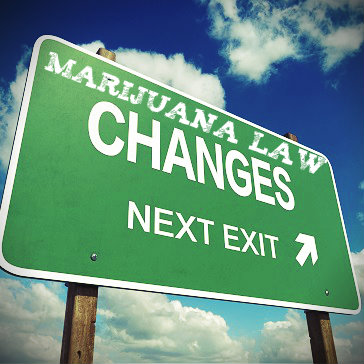 The changes in laws regarding the use of marijuana run parallel to the shift in the public’s general attitude toward this drug. Many supporters of marijuana legalization cite statistics and research that show how much safer the drug is than alcohol, a legal substance. Legalizing marijuana could make this less harmful substance as acceptable as alcohol. Many people see this as positive because it would provide tax revenue for state governments.
The changes in laws regarding the use of marijuana run parallel to the shift in the public’s general attitude toward this drug. Many supporters of marijuana legalization cite statistics and research that show how much safer the drug is than alcohol, a legal substance. Legalizing marijuana could make this less harmful substance as acceptable as alcohol. Many people see this as positive because it would provide tax revenue for state governments.
When you consider how children absorb the attitudes of the adults around them, you can understand how destructive legalized marijuana could be for young people. Most would agree that children and teens shouldn’t be allowed access to marijuana, but by sensing the lax attitude toward the drug that many adults have, young people will not take the risks of using marijuana seriously.
Alcohol, for instance, is legal for adults and considered to be socially acceptable among most people. As a result, teens use it too. Nearly half of all high school students drink, despite the negative consequences the behavior could produce. As adult attitudes toward marijuana shift to include social acceptance, you can expect teens to follow suit and begin to use the drug more often. As with alcohol, smoking marijuana is bad for teens. It affects the still-developing brain and can cause mental health issues as well as addiction.
Kids Poisoned By Marijuana
Laws giving adults greater access to marijuana mean children come into contact with the drug more than ever before. Because of this there has already been an increase in accidental ingestion by kids. Researchers found that there was a spike in visits to emergency rooms after states legalized medical marijuana and the federal government stated that it would not prosecute anyone with respect to its use for medical purposes.
One of the most common ways in which kids accidentally take in marijuana is through foods and drinks containing the drug. Such ingestions can cause children to have hallucinations, to have difficulty breathing, to lose consciousness, and even to die if the amounts are high enough or if the child isn’t treated immediately. What might be most worrisome about accidental poisonings of kids by marijuana is that it is a new phenomenon and doctors are not yet aware of all the possible harm it can cause.
Parental Neglect
Another way in which legalized marijuana, particularly for recreational use, may impact children is how parents getting high will treat their kids. Everyone knows how disruptive, and even abusive, an alcoholic parent can be to children, but what about a parent who gets hooked on using marijuana? Maybe the results would not be as devastating, but a parent who is high is not likely to do his or her job very well. Only time will tell if we see more neglect of children as marijuana use becomes legal.
Whenever laws change with respect to drugs or alcohol it is important to consider how the changes will affect young people. No matter how thoughtfully laws are crafted, or how careful adults and dispensaries are with the drug, children are bound to be impacted by increased access to marijuana.
Check Out More News On Drugs And Addiction
Your child is struggling with addiction. You have always been his caregiver. As a parent, you have taken care of him, helped him when he was down, kept him safe and took action when needed. Now that he is facing this very personal battle, you may feel helpless. How can you possibly take care of his needs when he is being ravaged by this disease? As a parent, the feeling of helplessness that accompanies the addiction of a child can be overwhelming and leave you with a sense of despair. You can’t fix the problem, but you can be there for your child and lend your support.
Why Can’t I Fix His Addiction?
You cannot fix your child’s addiction or cure him of it because addiction is a chronic disease with no hard and fast cure. You would never blame yourself for not being able to cure your child’s asthma or diabetes because you are not a doctor. You are not an addiction expert, a therapist or a doctor and you cannot treat or cure his disease. The sooner you are able to accept this fact, the better you will feel. That sense of helplessness will begin to lessen when you accept that your child has a disease that will require treatment by experts.
Can I Help My Child Overcome Addiction?
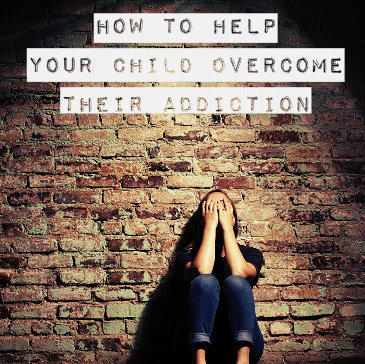 You do have the ability to help your addicted child. Once you accept that you cannot fix the problem, you can take steps to help him. Doing so will help to relieve those helpless feelings threatening to overwhelm you. In fact, taking action of some kind will keep you from falling into hopeless despair, which often leads to lethargy and inaction. Your child does need you now, so take steps to do what you can to help:
You do have the ability to help your addicted child. Once you accept that you cannot fix the problem, you can take steps to help him. Doing so will help to relieve those helpless feelings threatening to overwhelm you. In fact, taking action of some kind will keep you from falling into hopeless despair, which often leads to lethargy and inaction. Your child does need you now, so take steps to do what you can to help:
- Educate yourself – You have been blindsided by this problem and you probably have little experience with addiction. To better understand what your child is going through and what he needs from you, educate yourself about the disease of addiction. It will help you to have patience with him and to learn how to better support and assist him.
- Investigate treatment options – Unless your child is still a minor, you cannot force him to get professional help. You can, however, present him with options for treatment. Talk to your doctor about resources for addiction care and collect information about your options. Visit therapists and rehab facilities to get an idea of what is available and so that you can give your child the best choices when he is ready for help.
- Consider family therapy – Addiction is a disease that affects the entire family. Once your child has decided to get help, you can be an active participant. Engage in group therapy sessions with your child and other members of the family. He will find motivation in seeing that you and his loved ones are committed to his treatment.
- Build support – Your child is going through a difficult struggle, but so are you. You cannot give all your attention to him and forget about your own needs. Make sure you have built up support for yourself. Consider joining a support group for the loved ones of addicts. Also make sure that you have friends or family with whom you can talk when you feel overwhelmed and stressed. Support is necessary for addicts, but it is important for you too.
It is only natural to feel helpless when you cannot fix your child’s problem. You can guide him through it, though, and you can support him. When he is ready for help, be there for him and you will be doing the best you can.
If You Or Someone You Love Is Struggling With Drug Or Alcohol Abuse, You’ve Come To The Right Place – Help Is Just A Phone Call Away!
11 Aug 2014
Empowering Addicts
Shame and stigma are two of the most common words associated with being an addict, both for those using and those in recovery. As a society we still largely view addiction as a moral failing, while science keeps telling us it is a medical condition. Too many addicts fail to get help because of the shame they feel and the stigma attached to the condition. When we can empower addicts to seek treatment instead of shaming them, we all benefit.
Empowerment Over Shame Of Addiction
 Addiction has long been viewed as shameful for many reasons. Abusing substances does begin with a personal choice. No one is forced to use drugs or to drink. For this reason we have long assumed that addicts continue to have a choice and that they can always choose to stop using and turn their lives around. What many fail to realize is just how powerfully drugs and alcohol impact the brain and body. Substances that are highly addictive change the brain and make it almost impossible to stop using them.
Addiction has long been viewed as shameful for many reasons. Abusing substances does begin with a personal choice. No one is forced to use drugs or to drink. For this reason we have long assumed that addicts continue to have a choice and that they can always choose to stop using and turn their lives around. What many fail to realize is just how powerfully drugs and alcohol impact the brain and body. Substances that are highly addictive change the brain and make it almost impossible to stop using them.
As researchers in addiction uncover these truths, we should start to view addicts differently, but it takes time to change minds. We need to move toward empowering addicts, rather than making them feel ashamed. Empowerment means being educated about the disease of addiction and having the confidence to get much needed treatment. When we can empower addicts, we can better help them.
Taking Action To Empower Addicts
The good news is that ideas about and attitudes toward addiction are changing. It takes time to make a societal shift, but slowly and surely it seems to be happening. There are people who are taking specific actions to lift the stigma attached to addiction and to empower addicts as a whole and as individuals.
For instance, a new trend is taking place that involves gathering recovering addicts in large groups to celebrate recovery and sobriety. In the UK, the Brighton Recovery Walk is in its fourth year, while the nationwide UK Recovery Walk is on year six. These events include a large gathering of recovering addicts, out to celebrate their sobriety without shame. These recovery walks show the faces of addiction and battle the stigma of this disease with a positive message of hope and empowerment. Similar events have begun to pop up in the U.S. as well.
Other empowering actions work with individual addicts. For instance, Stanford University created a program to educate women in recovery in the humanities. The lessons these women learn help to empower and strengthen their recovery by teaching them about facing obstacles, giving them new perspectives and expanding their horizons. Most of all the courses show them that they are worthy of learning and of working with Stanford professors.
Empowering Individuals In Your Life
If you have an addict in your life, consider how you can empower her. Educate her about her disease and options for treatment. Help her by supporting her when she needs it and by being there during difficult times. Encourage her to attend events like the Recovery Walks and to seek out other programs that are available to help women like her.
The more you talk about addiction and refuse to treat it like a shameful series of choices that someone has made, the more we can empower all addicts. With empowerment comes the confidence to reach out and get help. Today we have a number of ways to treat addicts that are effective and no one should feel too ashamed to ask for that help.
Check Out Additional Recovery Inspiration Posts!
14 Jul 2014
How To Cope With Binge Eating Disorder As A Man
Eating disorders are typically thought of as women’s issues, but the truth is that men deal with these serious problems too. The struggle is sometimes worse for men because of the extra stigma attached to being a man who has food issues. Among the recognized eating disorders, binge eating is one that many men battle. Sometimes also referred to as food addiction, this disorder involves compulsive eating and usually also causes weight gain. If you are a man who binges on food, you are not alone and there is help for you.
What Is Binge Eating Disorder?
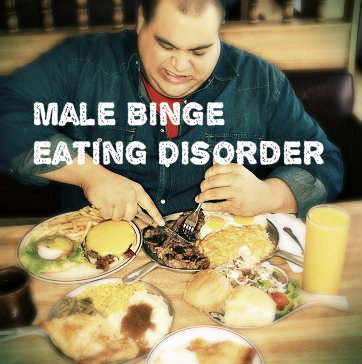 Binge eating disorder, or BED, is called food addiction too because it is a lot like an addiction. It is characterized by out-of-control eating binges, obsessive thoughts about eating, and feelings of guilt and shame associated with binges. Like drug or alcohol addicts you probably turn to food to cope with emotions. Maybe you eat because of stress. It could also be anxiety or depression that triggers your eating binges.
Binge eating disorder, or BED, is called food addiction too because it is a lot like an addiction. It is characterized by out-of-control eating binges, obsessive thoughts about eating, and feelings of guilt and shame associated with binges. Like drug or alcohol addicts you probably turn to food to cope with emotions. Maybe you eat because of stress. It could also be anxiety or depression that triggers your eating binges.
BED is more common than other eating disorders like anorexia and bulimia. One in 35 Americans struggles with binge eating. This statistic amounts to around five million women and three million men. While anorexia and bulimia are much more common in women than in men, BED is not rare in the male population.
Being A Man With An Eating Disorder
Having an eating disorder means coping with a difficult mental illness. In the case of BED, it also means dealing with addictive-like behaviors. Add to this being a man, and your battle becomes even greater. Women are more likely to get help for an eating disorder, while men are more likely to be in denial because of the added stigma. The statistics should assure you that you are not alone and that you are far from the only man dealing with binge eating. Here are some ways to help you cope and heal from your food addiction:
- Get Professional Help – If you can’t control yourself around food, you will never get better without the help of an experienced professional. It isn’t easy to ask for this help and you may feel embarrassed or ashamed to admit to your problem. It may help you to work with a male therapist, but make sure he has experience working with binge eaters.
- Find Support – One of the most important ways to successfully heal from an addictive disorder is to rely on the support of others. Overeating and binge eating support groups that are similar to AA are available. You should be able to find one that caters to men to make you feel more comfortable. If you can’t find a group in your area, look for online support groups for men with eating disorders.
- Stop Eating Alone – Binges typically occur when you are alone. Because of shame and embarrassment you are more likely to control yourself around other people. In addition to the support and professional help you get, force yourself to always eat with other people around. This will help you to control your urges.
- Replace Binges With Healthy Activities – Without eating binges to indulge in, you may be left with a void. Fill that hole with new and healthy activities. Exercise is a great choice because it will help you lose weight and give you more confidence. Any kind of hobby or new interest is a good way to replace your food binges.
Binge eating disorder is not easy to cope with for anyone. But as a man you face the added stigma of being a male with an eating problem. It’s time to face your fears and get the professional help you need. With the right therapist, support from other men and your own strength, you can conquer binge eating.
If You Or A Loved One Is Struggling With An Eating Disorder – Call Our Counselors Now – We Will Get You The Help You Need!


